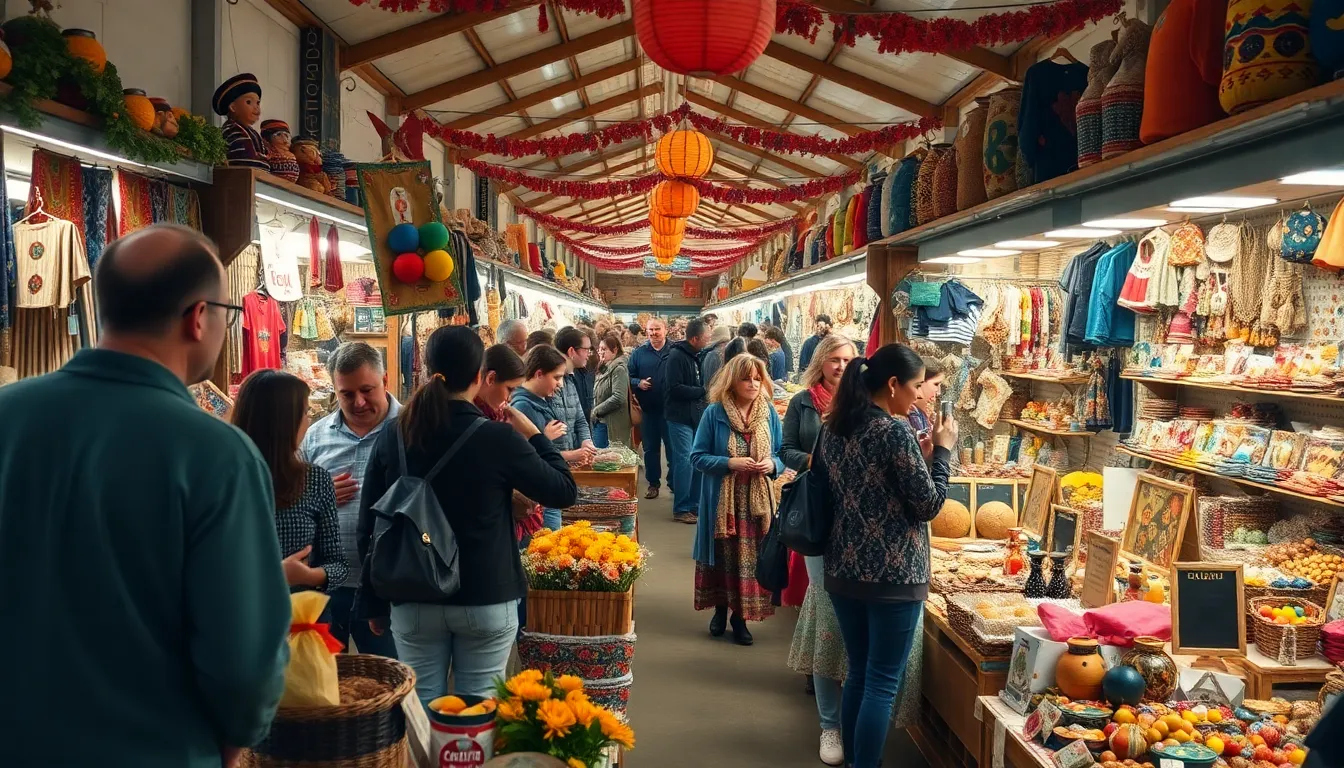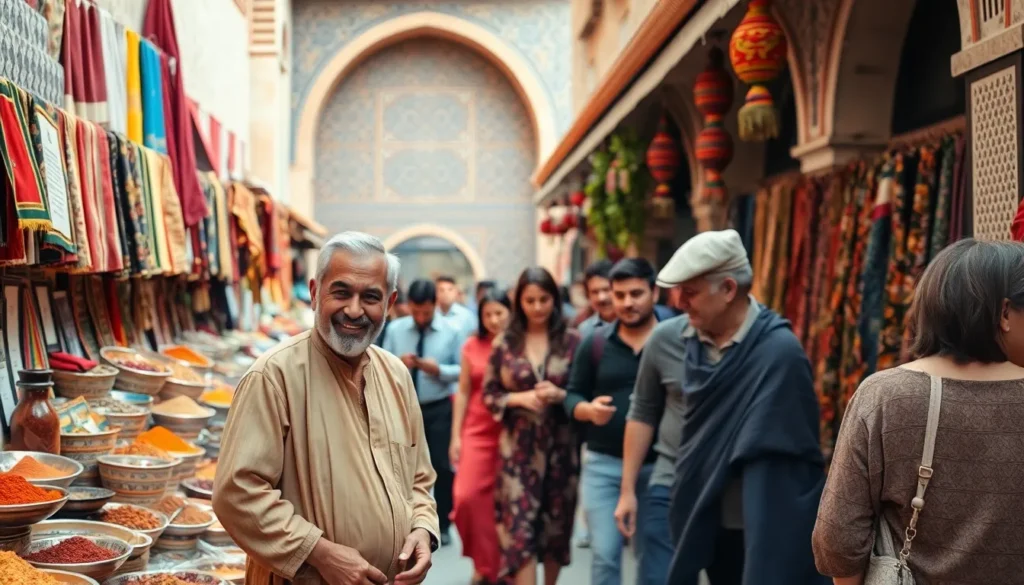From the bustling markets of Marrakech to the serene tea ceremonies in Kyoto, global customs shape our experiences and enrich our lives. These unique traditions aren’t just quirky rituals; they offer a glimpse into the heart and soul of cultures around the world. Imagine trying to navigate a family dinner in Italy without knowing that bringing a gift is a must—awkward, right?
Table of Contents
ToggleOverview of Global Customs
Global customs encompass the myriad practices and rituals that define cultural identity and communication. Insights into these customs reveal the significance each holds within its respective society. Many customs arise from historical traditions, social structures, and geographical influences.
Embracing global customs fosters appreciation for cultural diversity. Consider the importance of hospitality in many cultures; it strengthens bonds and creates a welcoming atmosphere. Observing local traditions during festivals or daily life can deepen understanding and respect among different communities.
Every region showcases distinct rituals that contribute to its identity. For instance, northern African cultures often celebrate with communal meals that emphasize sharing. In contrast, East Asian cultures may prioritize ceremonies that emphasize respect and harmony.
Different customs also reflect the values of their societies. Religious observances, for example, highlight the role of spirituality in cultural practices. Participating in these events provides valuable insights into the beliefs that shape communities.
Understanding global customs not only enriches personal experiences but also enhances global awareness. As societies become increasingly interconnected, recognizing and respecting these customs fosters a more inclusive environment. Cultural exchanges, like art exhibits and culinary festivals, serve as platforms for sharing customs and traditions.
Exploring various customs encourages a worldview that appreciates both uniqueness and commonality. Taking the time to learn about different practices cultivates empathy and strengthens global relationships. In this way, global customs play a crucial role in navigating an ever-evolving world.
Importance of Global Customs

Global customs serve as essential touchpoints for cultural identity and interpersonal connections. Understanding these practices deepens appreciation for diverse societies and strengthens global interactions.
Economic Impact
Cultural customs drive economic activities by promoting tourism and local businesses. Festivals attract millions of visitors, stimulating income for artisans, hospitality sectors, and vendors. Local economies thrive as customs draw international attention. For example, traditional markets generate significant revenue, showcasing region-specific products. Unique customs, such as craft fairs, create job opportunities and encourage investment in local industries. Economic advantages arise as cultural appreciation increases, fostering entrepreneurship. Trade events often highlight customs, linking products to their heritage. Businesses leverage local traditions, enhancing branding strategies and customer loyalty.
Cultural Exchange
Global customs foster cultural exchange, enriching experiences for individuals and communities. This interaction encourages sharing traditions, languages, and cuisines, furthering understanding among diverse groups. Events like culinary festivals and art exhibits promote the blending of customs, creating vibrant cultural dialogues. Similarly, educational programs often celebrate global rituals, helping participants gain insights into different lifestyles. Cultural exchanges help dismantle stereotypes and build empathy, ultimately creating stronger global ties. These interactions offer opportunities for collaboration and innovation, showcasing how customs influence modern identity and practices. Engaging with various traditions enhances not only personal experiences but also mutual respect among nations.
Challenges Facing Global Customs
Global customs face several challenges affecting their efficiency and effectiveness. Understanding these obstacles provides insight into the complexities of international trade.
Trade Barriers
Trade barriers significantly impact global customs operations. Tariffs, quotas, and import duties create hurdles for businesses seeking to enter foreign markets. Many companies face delays in shipment due to increased inspections and regulatory compliance demands. These barriers can lead to higher costs for consumers and reduced availability of goods. Effective customs management remains crucial for navigating these challenges and ensuring smooth cross-border transactions.
Regulatory Differences
Regulatory differences present another critical challenge in global customs. Each country has unique laws governing trade, leading to inconsistencies in documentation and compliance requirements. Some nations may enforce strict standards on product safety, labeling, and environmental impact. Navigating these varying regulations complicates the customs process, often resulting in unanticipated delays. Customs authorities must adapt to these differences to streamline operations and enhance international cooperation.
Innovations in Global Customs
Innovations reshaping global customs enhance efficiency and foster collaboration. These advancements address existing challenges while promoting smoother international trade.
Technology Integration
Technology plays a pivotal role in modernizing customs operations. Automated systems reduce manual errors, increasing accuracy in duty calculations. Blockchain technology improves transparency, ensuring secure data exchanges among stakeholders. Moreover, digital platforms facilitate real-time tracking of shipments, helping customs agencies monitor compliance efficiently. Mobile applications provide easy access to customs information, making procedures more accessible for businesses and travelers.
Streamlining Processes
Streamlining processes leads to faster clearance times at borders. Implementing risk management strategies helps prioritize high-risk shipments, allowing for quicker processing of low-risk goods. Electronic documentation minimizes paperwork, accelerating transaction speeds. Data analytics enables customs authorities to identify trends and optimize enforcement strategies. Collaboration between nations strengthens harmonization of customs rules, further simplifying cross-border trade.
Future of Global Customs
Technological advancements are transforming global customs practices. Automation streamlines processes, leading to increased efficiency in handling customs documentation and clearance. Data analytics plays a critical role, helping authorities optimize enforcement strategies and enhance risk assessment methods.
Increased collaboration among nations fosters greater harmonization of customs regulations. Bilateral agreements facilitate smoother cross-border transactions by reducing inconsistencies in customs procedures. Enhanced communication between customs agencies worldwide contributes to the real-time sharing of information.
Sustainability initiatives are also gaining momentum. Green customs practices advocate for environmentally friendly methods in logistics and trade. These practices not only reduce carbon footprints but also align with global efforts toward sustainability.
E-commerce continues to reshape customs operations. With the rise of online shopping, customs authorities must adapt to manage the influx of small shipments effectively. This adaptation requires innovative solutions to ensure compliance and efficiency in customs processing.
Regional customs unions are emerging as key players in enhancing trade flow. These unions promote cooperation between neighboring countries, facilitating the movement of goods and services. They also work to standardize regulations, providing a streamlined framework for customs management.
Emerging technologies like artificial intelligence are set to improve predictive capabilities. Customs authorities can anticipate challenges in trade and address them proactively using AI-driven insights. This tech-driven approach fosters a resilient customs landscape.
The future of global customs hinges on embracing technological innovations and fostering international collaboration. Prioritizing sustainability and adapting to evolving trade patterns will shape the customs environment for years to come.
Global customs play a crucial role in shaping cultural identities and enhancing interpersonal connections. They reflect societal values and foster understanding in an increasingly interconnected world. As technology continues to evolve, customs practices will adapt to meet the demands of modern trade and cultural exchange.
Embracing these innovations while prioritizing sustainability can lead to more efficient customs processes. This not only benefits businesses and economies but also enriches the global community. By appreciating and participating in diverse customs, individuals can contribute to a more empathetic and connected world.





